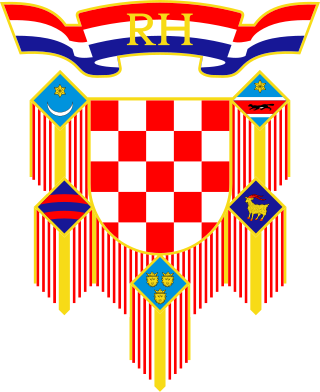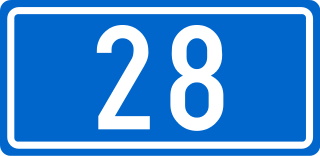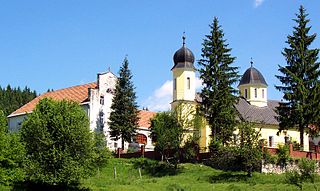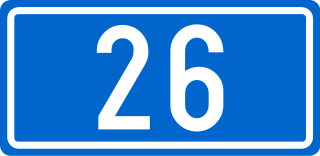Related Research Articles
The politics of Croatia are defined by a parliamentary, representative democratic republic framework, where the Prime Minister of Croatia is the head of government in a multi-party system. Executive power is exercised by the Government and the President of Croatia. Legislative power is vested in the Croatian Parliament. The Judiciary is independent of the executive and the legislature. The parliament adopted the current Constitution of Croatia on 22 December 1990 and decided to declare independence from Yugoslavia on 25 May 1991. The Constitutional Decision on the Sovereignty and Independence of the Republic of Croatia came into effect on 8 October 1991. The constitution has since been amended several times. The first modern parties in the country developed in the middle of the 19th century, and their agenda and appeal changed, reflecting major social changes, such as the breakup of Austria-Hungary, the Kingdom of Serbs, Croats and Slovenes, dictatorship and social upheavals in the kingdom, World War II, the establishment of Communist rule and the breakup of the SFR Yugoslavia.

The president of Croatia, officially the president of the Republic of Croatia, is the head of state, commander-in-chief of the military and chief representative of the Republic of Croatia both within the country and abroad. The president is the holder of the highest office in Croatia. However, the president is not the head of the executive branch as Croatia has a parliamentary system in which the holder of the post of prime minister is the most powerful person within the country's constitutional framework and everyday politics.

The Constitution of the Republic of Croatia is promulgated by the Croatian Parliament.
The Government of Croatia, formally the Government of the Republic of Croatia, commonly abbreviated to Croatian Government, is the main executive branch of government in Croatia. It is led by the president of the Government, informally abbreviated to premier or prime minister. The prime minister is nominated by the president of the Republic from among those candidates who enjoy majority support in the Croatian Parliament; the candidate is then chosen by the Parliament. There are 20 other government members, serving as deputy prime ministers, government ministers or both; they are chosen by the prime minister and confirmed by the Parliament (Sabor). The Government of the Republic of Croatia exercises its executive powers in conformity with the Croatian Constitution and legislation enacted by the Croatian Parliament. The current government is led by Prime Minister Andrej Plenković.

The president of the Socialist Federal Republic of Yugoslavia was the head of state of that country from 14 January 1953 to 4 May 1980. Josip Broz Tito was the only person to occupy the office. Tito was also concurrently President of the League of Communists of Yugoslavia. Tito was eventually declared president for life and with his death in 1980 the office was discontinued and the new office of President of the Presidency of Yugoslavia took its place.
Croatian Canadians are Canadian citizens who are of Croatian descent. The community exists in major cities including the Greater Toronto Area, Hamilton, Ottawa, Vancouver, Calgary, Edmonton, Winnipeg, Windsor, Montreal and Waterloo Region.

Vjesnik was a Croatian state-owned daily newspaper published in Zagreb. Originally established in 1940 as a wartime illegal publication of the Communist Party of Croatia, it later built and maintained a reputation as Croatia's newspaper of record during most of its post-war history. It ceased publication in April 2012. "Tiskara Vjesnik" and "Vjesnik d.d." were the namesakes of the Vjesnik's printing office and publishing house, respectively.

The President of the Federal Executive Council was the head of government of the Socialist Federal Republic of Yugoslavia, from the adoption of the 1963 constitution until the complete breakup of the country in 1992. Most non-Yugoslav sources referred to the post as "Prime Minister."

The Homeland War Memorial is a Croatian state medal awarded to both Croatian and foreign citizens who participated in the nation's Croatian War of Independence as a volunteer, part of the Croatian Army and Croatian Council of Defence or in some other role.

D28 is a state road in central Croatia connecting the D5 and D45 in Veliki Zdenci to the D10 in Gradec interchange. The road is 70.7 km (43.9 mi) The road, as well as all other state roads in Croatia, is managed and maintained by Hrvatske ceste, a state-owned company.

The Grand Order of King Tomislav, or officially the Grand Order of King Tomislav with Sash and Great Morning Star, is the highest state order of Croatia. It is usually awarded to top foreign officials for their contribution to the improvement of Croatia's good standing internationally as well as achievements in developing international relations between Croatia and their respective countries. It is awarded by the President of Croatia. The order has one class. It is named after King Tomislav of Croatia.

D41 is a state road in the central Croatia connecting Križevci to Koprivnica and Gola border crossing to Hungary. The road is 57.9 km (36.0 mi) long.

Eastern Orthodoxy in Croatia refers to adherents, religious communities, institutions and organizations of Eastern Orthodox Christianity in Croatia. It is the second-largest religious denomination in Croatia, behind the Roman Catholic Church. Over 128 000 people, forming 3.32% of the total Croatian population, are Eastern Orthodox Christians (2021).

D220 is a state road in the central Dalmatia region of Croatia that connects the A1 motorway's Bisko interchange to the D60 state road, facilitating access from A1 motorway to Imotski via D60 state road and to Kamensko border crossing to Livno, Bosnia and Herzegovina. The road is 28.9 km (18.0 mi) long.

Elections were held on municipal, provincial, republican and federal levels in Yugoslavia from its foundation in 1918 throughout its breakup in 1992.

D26 is a state road in central Croatia connecting the D5 in Daruvar and the D10 expressway near Vrbovec, comprising a connection to the planned but cancelled A12 motorway route. The road is 88.5 km (55.0 mi) long.

D22 is a state road in the central Croatia connecting Novi Marof via Križevci, to the Sveti Ivan Žabno. The road is 42.7 km (26.5 mi) long.
The 1st Executive Council of the People's Republic of Croatia was that state's executive organ of government in 1953.
The 2nd Executive Council of the People's Republic of Croatia was that state's executive organ of government from 1953 to 1958. The Executive Council was voted in at a joint session of the Republican Council and the Council of Producers on 18 December 1953.
The Socialist Republic of Croatia, one of the constituent countries of the Socialist Federal Republic of Yugoslavia had gone through a number of phases in its political life, during which its major political characteristics changed - its name, its top level leadership and ultimately its political organization.
References
- 1 2 Bukvić 2012, p. 13.